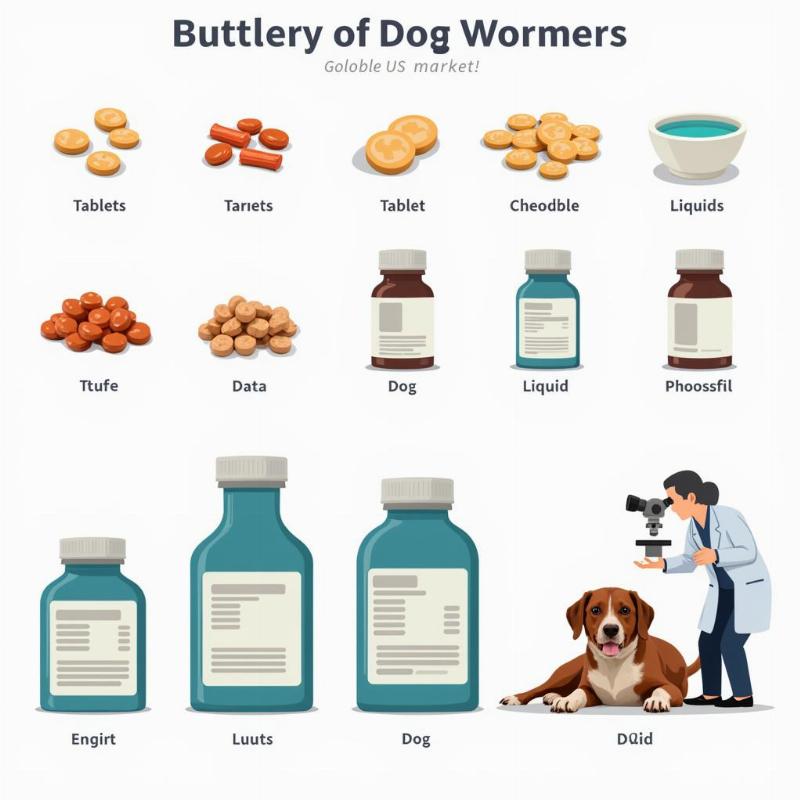Choosing the best wormer for your large dog can feel overwhelming. With so many options on the market, how do you know which one is safe, effective, and right for your furry friend? This guide will walk you through everything you need to know about selecting the best wormer for large dogs, including common types of worms, different worming medications, and important safety considerations.
Understanding Common Canine Worms
Before choosing a wormer, it’s important to understand the types of intestinal parasites that commonly affect dogs. These include roundworms, hookworms, whipworms, and tapeworms. Each type of worm requires a specific treatment, so accurate diagnosis is crucial. Your veterinarian can perform a fecal examination to identify the specific type of worm your dog has and recommend the appropriate wormer.  Choosing the right dog wormer for large dogs
Choosing the right dog wormer for large dogs
Types of Dog Wormers
Several types of dewormers are available for large dogs. Common options include:
- Praziquantel: Effective against tapeworms.
- Pyrantel Pamoate: Effective against roundworms and hookworms.
- Fenbendazole: Effective against roundworms, hookworms, whipworms, and some types of tapeworms.
- Milbendazole: Similar to fenbendazole, effective against a broad spectrum of worms.
- Moxidectin: A broad-spectrum wormer often used in heartworm preventatives.
It’s important to note that not all dewormers are created equal. Some are over-the-counter, while others require a prescription from your veterinarian. Always consult with your vet to determine the best wormer for your dog’s specific needs.
Choosing the Right Wormer for Your Large Dog
When selecting a wormer for your large dog, consider the following factors:
- Your dog’s age and health: Puppies and senior dogs may require different dosages or types of wormers.
- Lifestyle and environment: Dogs who spend a lot of time outdoors or in contact with other animals may be at higher risk for certain types of worms.
- Specific type of worm: As mentioned earlier, different wormers target different parasites.
- Veterinarian recommendations: Always consult your vet before giving your dog any medication. They can help you choose the safest and most effective wormer based on your dog’s individual needs.
Administering Dewormer to Your Large Dog
Follow your veterinarian’s instructions carefully when administering dewormer to your large dog. Most dewormers are given orally, either in tablet, chewable, or liquid form. Make sure your dog consumes the entire dose.
Preventing Worm Infestations
While regular deworming is important, prevention is always the best approach. Here are some tips to help prevent worm infestations in your large dog:
- Regular fecal examinations: Schedule regular vet visits for fecal exams to detect and treat worms early.
- Proper hygiene: Pick up your dog’s feces immediately and dispose of it properly.
- Environmental control: Keep your yard clean and free of standing water.
- Preventative medications: Talk to your veterinarian about preventative medications that can protect your dog from heartworms and other intestinal parasites.
Conclusion
Choosing the best wormer for large dogs involves careful consideration of various factors. Always consult with your veterinarian to determine the right wormer and dosage for your dog’s specific needs. By understanding the types of worms, available treatments, and preventative measures, you can help keep your furry companion healthy and parasite-free. Remember, regular veterinary checkups and preventative care are essential for maintaining your large dog’s overall health and well-being.
FAQ
- How often should I deworm my large dog? Your veterinarian can recommend a deworming schedule based on your dog’s age, lifestyle, and risk factors.
- Can I use over-the-counter dewormers? While some over-the-counter dewormers are available, it’s always best to consult with your vet before giving your dog any medication.
- What are the signs of worms in dogs? Common signs include vomiting, diarrhea, weight loss, a pot-bellied appearance, and scooting.
- Are heartworm preventatives also effective against intestinal worms? Some heartworm preventatives also offer protection against certain intestinal parasites.
- Can humans get worms from dogs? Yes, some types of dog worms can be transmitted to humans. Practicing good hygiene is essential to prevent transmission.
- What should I do if I think my dog has worms? Contact your veterinarian immediately for diagnosis and treatment.
- Are there any natural remedies for dog worms? While some natural remedies are touted for their deworming properties, their effectiveness is not scientifically proven. Always consult with your vet before trying any alternative treatments.
You might also be interested in:
dog wormer and flea treatment in one tablet
how much safeguard paste horse wormer to give a dog
best wormer for small dogs
can you use horse dewormer on dogs
About Beautdogs.us:
Beautdogs.us is your premier resource for all things dog-related in the US. We offer expert advice on dog breeds, care, and the best products available. Whether you’re a seasoned dog owner or just starting your journey, Beautdogs.us provides reliable information and guidance to help you give your canine companion the best life possible. For expert advice, contact us at [email protected] or call us at +1 501-555-7529.